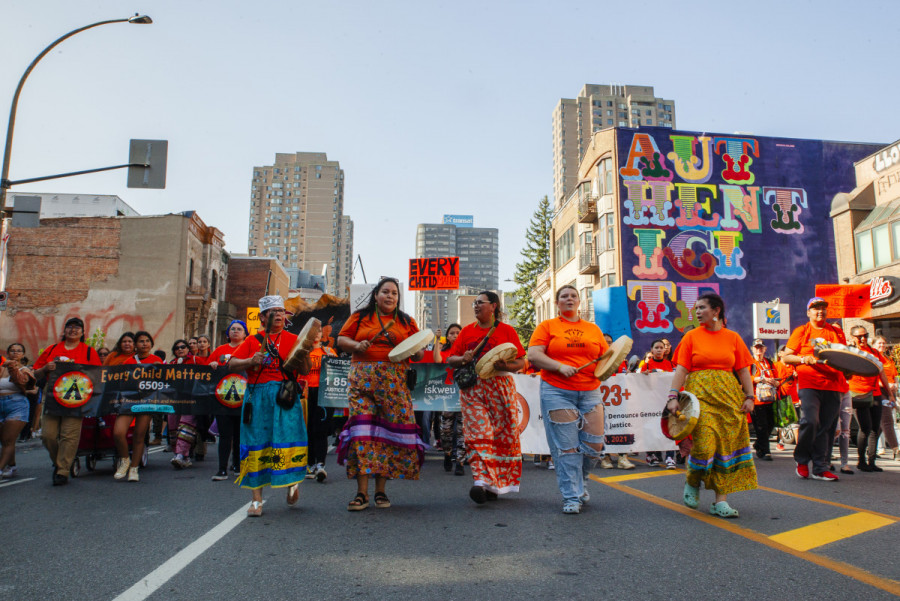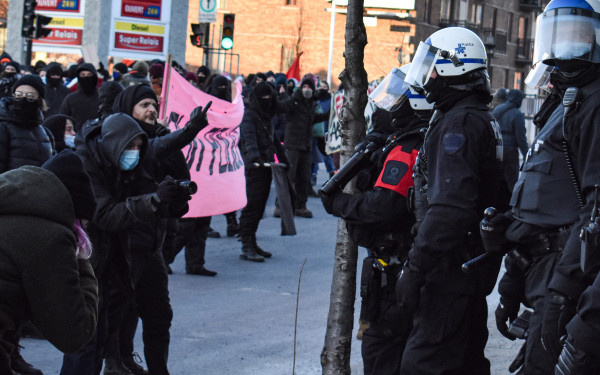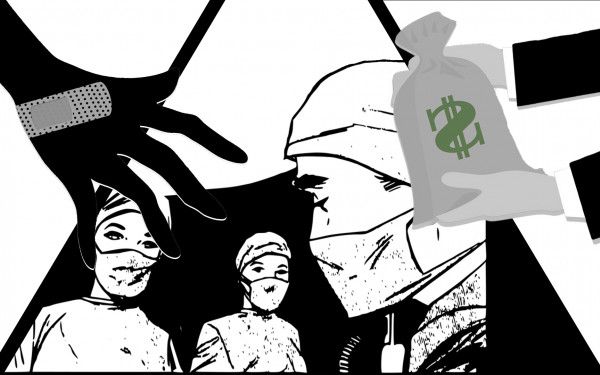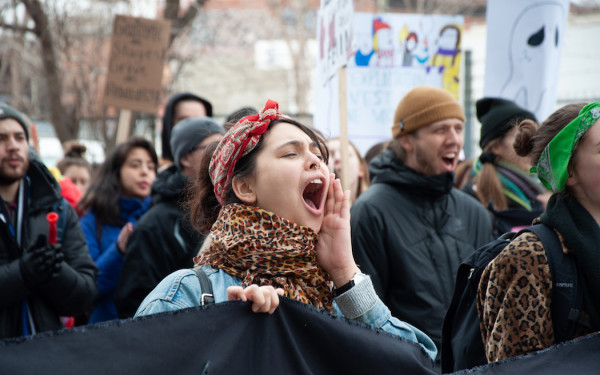Walking for healing and action
Protesters rallied in solidarity for the Every Child Matters march
On Sept. 30, hundreds of people made up the sea of orange shirts walking in remembrance of the genocide that Canada committed against Indigenous children in residential schools, and in solidarity with survivors and family members of those affected.
The crowd marched together from Jeanne Mance Park to the former Macdonald Monument in downtown Montreal chanting “No pride in genocide” and “Land Back”. The spirit of the event mixed grief and anger with pride, strength and radical love.
“We want this day to be about empowerment,” event organizer Na’kuset said. “We want this day to be about being inspired to do change because that's what I try to do, and if I can do it, y'all can too.”
This was the third annual Every Child Matters march in Montreal organized by the Native Women’s Shelter of Montreal and Resilience Montreal. The National Truth and Reconciliation Day gathering brought people of all walks of life together in collective healing and concrete reconciliation action against systemic racism, a reality of Canadian society that Quebec’s Legault government refuses to recognize.
“I am happy that you were all here and I'm happy that our elder brother, the sun, has shone for us today to shine a light on a dark period and a darkness that still haunts us today,” said Mohawk land defender Ellen Gabriel.
Eight speakers and several residential school survivors paid tribute to lives taken by the traumas of colonialism and celebrated the youth who lead Indigenous Peoples forward. Speakers included Gabriel, Resilience Montreal board member Ann Dear, Native Women’s Shelter Director Na’kuset, artist Beatrice Deer, Kevin Deer, and Ben Geboe among others. The Traveling Spirit Drum group played songs to honour and uplift as people clapped, cried and cheered together in grief and palpable pride.
“There is a law, but nobody’s implementing it,” Gabriel said.
Speakers called on marchers to put pressure on politicians and governments to implement the United Nations Declaration on the Rights of Indigenous Peoples. They demanded education institutions and media organizations to consistently raise awareness about systemic racism and residential schools. They urged marchers to continue this struggle for justice and dignity once the orange shirts came off.
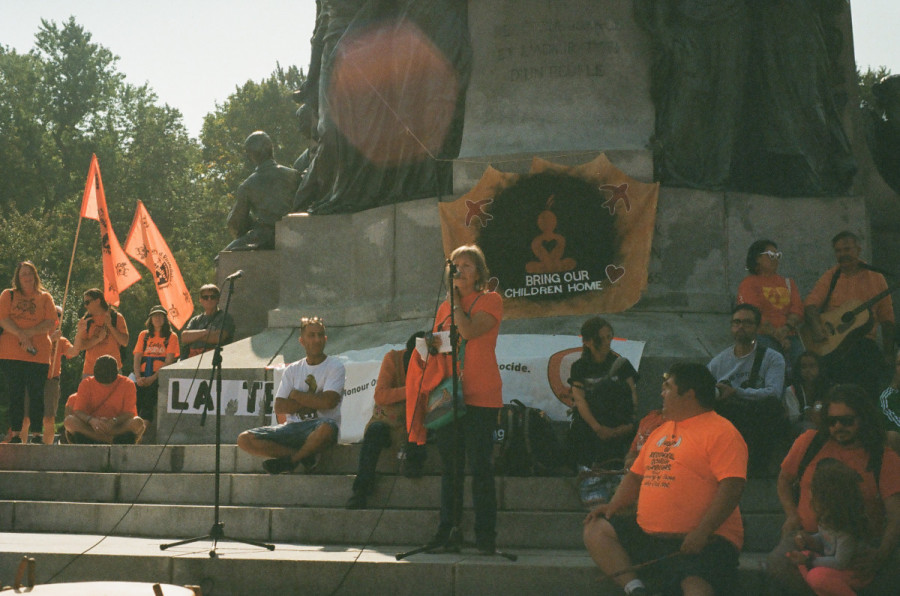
This march comes in the context of the past years’ continuation of missing and murdered Indigenous people and a lack of concrete reconciliation efforts on the part of federal and provincial governments. More than 1700 unmarked graves have been discovered across the country since 2021, when the first one was identified in Kamloops, B.C.. Recent evidence of historic human remains have been detected in the old Royal Victoria Hospital site, which McGill University is excavating for a new university building. But the digging continues despite the agreement signed between McGill University, Société québécoise des infrastructures (SQI) and the Mohawk Mothers group to halt construction until the archaeological investigation is complete.
Healing from intergenerational trauma as a community is an everyday reality. “This is a fun day, to try to bring people together, to recognize that this day is not just one day – it should actually be every single day - and to really push the government to do better when it comes to applying recommendations, because they're ignoring them,” Na’kuset said.
Canada’s practice of systemic racism and erasure of Indigenous Peoples has a long history and an active present.
From 1863 to 1996, the Canadian government, partnering with many Catholic churches, stole over 150,000 First Nations, Inuit and Métis children from their families and forced them into abusive residential schools with the known goal of destroying Indigenous cultures and languages. Children were punished for speaking their language, given numbers as names, and many were forced to work rather than receive an education. “I am grateful for those survivors who told their stories, in spite of the hurt they felt and the tears that they shed,” said Gabriel. “We cannot forget them.”
With the same goal of complete cultural assimilation, the Canadian child welfare authorities also stole around 20,000 Indigenous children from their families and placed them for adoption in non-Indigenous households, often maintaining no records of their biological parents. Na’kuset is a survivor of what is known as the Sixties Scoop. Her experience has led her to become a leader in Indigenous rights defence and grassroots aid for those experiencing homelessness in Montreal.
Na’kuset said the actions of the government, the Catholic Church and the police “still are damaging.” She said, “today we still have issues with the police, you know, Indigenous women are 11 times more likely to be racial profiled than anyone else here in Montreal.”
Though federally recognized, the province of Quebec has not adopted National Truth and Reconciliation Day as an official statutory holiday. Marcher Stéphane Lavoix voted for the Coalition Avenir Québec (CAQ) government in 2018 in part because of their promise to adopt the United Nations Declaration on the Rights of Indigenous Peoples (UNDRIP). Instead, he saw the government’s blatant denial of the systemic racism subjected to his Mohawk community. He said it feels like the Quebec government is saying “well it’s not important.” Lavoix felt pride in how many people showed up to mark this day. “It shows me that Quebecers as well as other ethnic communities are participating, it’s not just First Nations,” Lavoix said.
In 2013, the Truth and Reconciliation Commission began its work of investigating Canada’s history of genocide and put together 94 concrete Calls to Action in 2015 with recommendations addressing child welfare, education, justice, health care, and reconciliation. By 2023, only 13 of these calls to action have been completed, two of which were fulfilled in the past year alone.
Among the crowd, one side of marcher Wendy Wang’s poster read “accountability and action.”
“The Truth and Reconciliation Commission ended seven years ago, and it doesn't make sense that only 13 out of 94 have been completed,” said Wang. “There’s so much more we can do that we know we should do, but we’re not.” The majority of completed calls fall under the reconciliation category. None addressing child welfare are completed.
“It's more than wearing an orange shirt. It's walking with us and listening to our leaders, getting the information and choosing better,” Na’kuset said.
This article originally appeared in Volume 44, Issue 3, published October 3, 2023.

